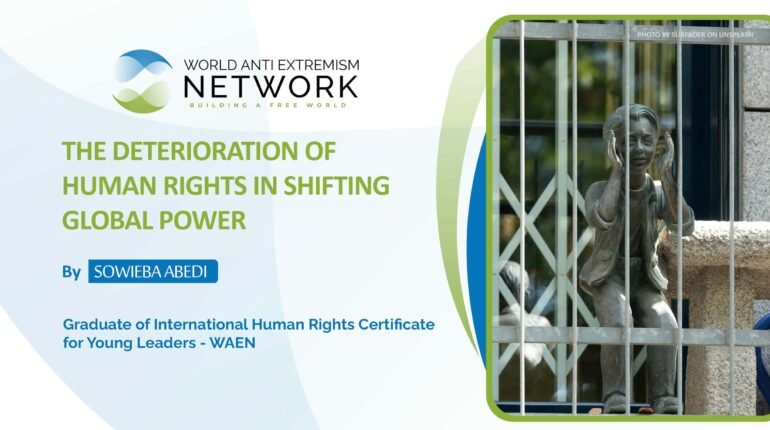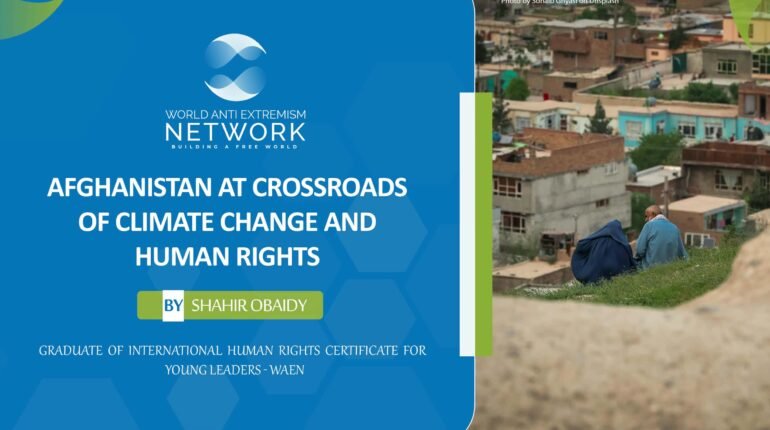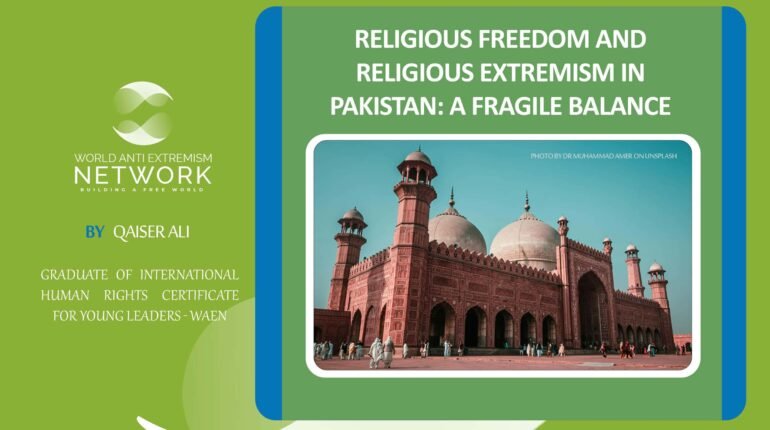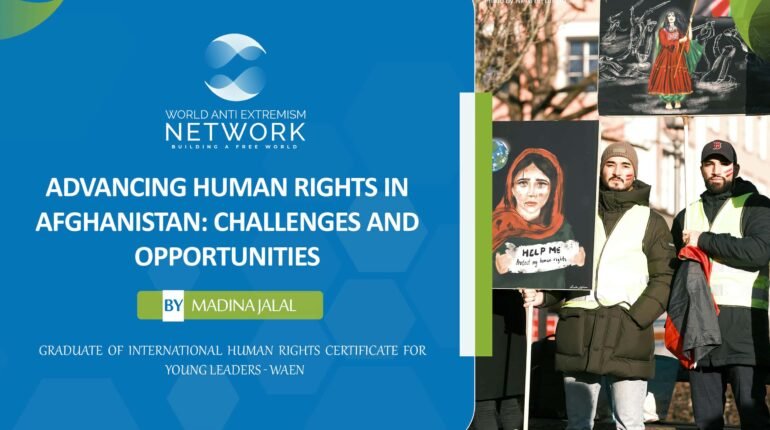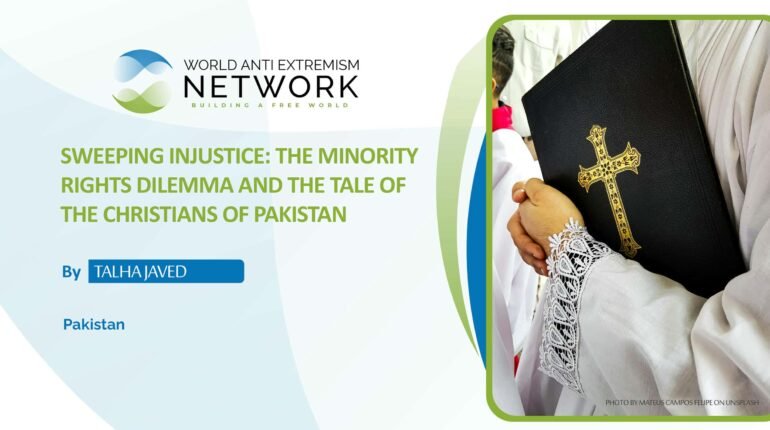Enforced Disappearance: The Citizens of an Orwellian State
- World Anti Extremism Network
- Enforced Disappearance: The Citizens of an Orwellian State
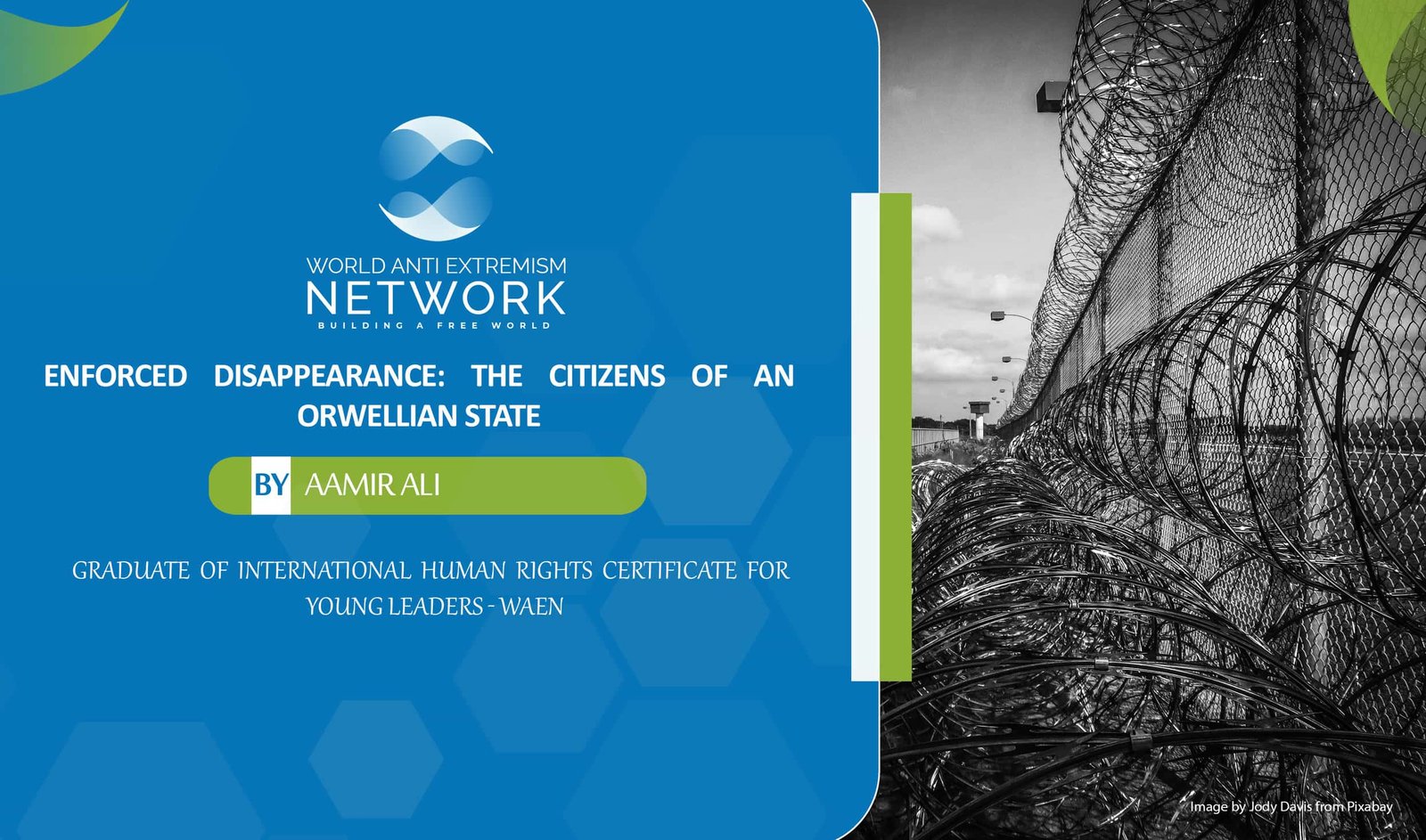
Mrs. Marri, wife of Muhammad Marri who has been missing for the last 12 years, said in one of her interviews with Dawn News: “The dead have a grave, but the disappeared persons have no sign__ dead or alive. And we can neither mourn their absence nor celebrate our happiness”.
In Pakistan, the threat to fundamental human rights has surpassed all limits and reached its pinnacle. As per the Commission on Inquiry on Enforced Disappearances (COIED), more than 8000 people have been victims of illegal abductions since 2001. The Voice of Baloch Missing Persons (VBMP) alleges that more than 18000 people have forcibly disappeared from Baluchistan alone since 2001. In 2020, the report on Sindh’s Missing Children estimated that over 1200 children went missing in Sindh province due to unabated human trafficking. These figures are enough to understand the gravity of the crime being perpetuated by the state and non-state actors in the country thanks to the pervasive lack of rule of law.
Enforced disappearance is an immoral and inhumane act in which a person is susceptible to grave human rights violations, sexual abuse, enforced organ donation, slavery, and bonded labor to extra judicial killings. A disappeared person remains outside the reach of the law. Flabbergasted and disillusioned, families keep running from pillar to post to know the fate of their loved ones. Sultan Mehmood, brother of disappeared Zahid and Sadiq Amin, at a rally in Islamabad organized by DHR, said that:
“It’s been 9 years. In these 9 years, there has been no Eid for us, no happiness, no good days, no nice clothes. Whenever there is something to celebrate we wonder what condition our brother is in, whether he is sick, whether he has eaten.”
Every major religion or civilization acknowledges the right to life. Similarly, Pakistan’s constitution also guarantees the rights of every citizen. Article 9 of the Constitution unequivocally states: “No person shall be deprived of life and liberty following the law”. Also, article 11 draws clear lines about the safeguard as to arrest and detention of the person. It says, “No person shall be detained in custody without being informed and that in case of any arrest; he shall be given the right to consult and be defended by a legal practitioner of his choice”. Enforced disappearance categorically negates these articles. Although the constitution has guaranteed the protection of fundamental rights, the deteriorating rule of law in the country engenders a culture of impunity. We see some major key players in action behind this grave crime of enforced disappearance. They are: terrorist organizations, security establishments, human traffickers, sex traffickers, organ traffickers, and illegal immigrants.
In the book “Pakistan: A Prison of Geography” Christine Fair explains that Terrorism and extremism are among the legacies Pakistan inherited due to its geography: proximity with Afghanistan and India. Terrorist organizations like Tehreek Taliban Pakistan, (TTP) and Al Qaeda have been indulged in the filthy act of enforced disappearances since 2001. According to the Pakistan Commission on Human Rights, PCHR, TTP is involved in the enforced disappearances of more than 1000 people in 2020 alone. According to UNICEF, TTP has been recruiting and brainwashing children to use them as a tool of terror in achieving their political goals. Balochistan Liberation Army, BLA is another organization doing the same. As per the reports of Amnesty International, BLA is also one of the main culprits behind enforced disappearances in Baluchistan. It abducts people, brainwashes them, and uses them to challenge the writ of the state by launching attacks against civilians as is evident from the recent train attack where a woman suicide bomber took the lives of 26 innocent people by exploding herself on a train station.
When the situation gets out of hand and multiple military operations fail to subdue these formidable security challenges, the security agencies resort to half-baked cosmetic measures like arbitrary arrests and enforced disappearances. An article in ‘The Guardian’ titled “Kidnap, torture, murder: the plight of Pakistan’s thousands of disappeared” discusses extrajudicial abductions and enforced disappearances by military agencies in Pakistan over the past two decades Sometimes it’s also done to silence the voices of people who feel betrayed by the state in fulfilling their fundamental rights. When poverty strikes, people show resentment and conduct protests, causing riots, and endangering the internal security of the country. In such time enforced disappearance is again used as a powerful tool by the hands of the ubiquitous security establishment. For instance, The Guardian in its report, “Pakistan’s disappeared: the estimated 5000 people taken by the state” revealed the role of the military in enforced disappearances. Moreover, While the political clout of the security establishment has unprecedentedly escalated in the face of unrestrained political turmoil in the country, the role of the incumbent government in rendering any relief to the affected communities is conspicuous by its absence. Since 2018, the security establishment has transcended all the boundaries of decency and subjugated civilian supremacy to the detriment of human rights. Human Rights Watch (HRW) reported that Pakistan’s Commission of Inquiry on Enforced Disappearances received 8,463 complaints between March 2011 and June 2022. However, HRW noted that activists believe the actual number of enforced disappearances is much higher.
Through enforced disappearance, the security establishment is creating an environment where even judges dread to discuss the severity of the crime. The Pakistan Bar Council’s statement (2020) condemned the intimidation and harassment of judges addressing enforced disappearances. Still, the Human Rights Watch Report (2020), observed that “judges who have ruled against the military or government on enforced disappearances have faced intimidation and reprisal”. This shows that in the face of the increasing role of the security establishment in politics, the justice system of Pakistan is rendered speechless when it comes to solving the decades-old case of enforced disappearances.
Another key player behind this crime is the Human traffickers. Lack of accountability and poor governance have nurtured a culture of impunity in the country. This has led to unbridled human rights violations against minors and cornered factions of society. The country is a source, transit point, and destination for human trafficking. The victims are forcibly taken from remote areas and exploited in various forms, including forced labor, sex trafficking, and bonded labor. According to the 2023, Trafficking in Person Report: Pakistan remained a Tier 2 country. The report says that Pakistan doesn’t fully meet the minimum criteria for eliminating trafficking in person.
Sex trafficking is also a major reason behind enforced disappearances in Pakistan. This social malaise is pervasive in the country where children and women are being kidnapped and smuggled for the sake of sexual exploitation. Furthermore, deteriorating economic and security situations in the country have engendered a wider window of illegal emigration. Extensive criminal networks in the country have facilitated illegal emigration often using coercion, deception, and force. Consequently, poverty-stricken people being attracted by greener pastures abroad succumb to these criminal groups in the face of an expensive emigration system.
The above-mentioned facts suggest that the history of enforced disappearances in Pakistan underlies a complex landscape. A lack of proper understanding of the issue leads people astray. Alleging the state to be the sole perpetrator of enforced disappearance is therefore a wrong approach; there are other key actors as well who play an equal part in the perpetuation of this crime. Hence, the acknowledgment of the complexity of this crime should be the first step in the right direction. Nevertheless, there are numerous occasions when the security agencies resorted to brute force even against peaceful protests. In 2024, when the Baloch Yakjehti Movements, BYM held a peaceful rally against enforced disappearances, the state used brutal force against them and cold-heartedly deported them to Quetta denouncing them as terrorists. Human rights activists from other segments of society also find little freedom to express solidarity with the missing persons. According to Amnesty International, in 2020, Pakistan’s government blocked X accounts of activists and journalists critical of enforced disappearances.
As the shadow of the Orwellian state takes everyone in its grip, the future paints a grim picture. The candle of hope flickers and envisages more human rights violations and it will keep happening if proper steps are not taken. It is the responsibility of human rights activists to come together and raise voices against such crimes and compel parliament and judiciary to draw legislation to counter such violations of human rights. These reckless violations should be checked lest every person will find him a victim of the state’s excesses. Human rights advocates must not lose hope and continue to fight against enforced disappearance. Last but not least, advocacy must be transformed to meet the present-day circumstances: the potential of social media should be utilized to bring the violators of human rights to justice.

About the Author
Aamir Ali is a Lecturer of Pakistan Studies and History at Ali Trust College, Islamabad. He holds an MSc degree in Defense and Strategic Studies (DSS) from Quaid-i-Azam University, Islamabad, where he completed his thesis titled "Sino-Indian Quest for the Territories of Jammu and Kashmir: Implications for Pakistan."His research interests encompass both traditional and non-traditional security dynamics in the South Asian region. He also possesses expertise in nuclear studies, offering a comprehensive understanding of regional security complexities.As an academic, Aamir Ali is dedicated to fostering critical thinking and nuanced analysis among his students, encouraging a deeper understanding of Pakistan's history, politics, and strategic environment.
The opinions expressed in these articles are solely those of the authors and do not reflect the views or positions of the organization. If you find any information incorrect, please contact (research@worldantiextremism.org), and we would be happy to assist you. You can download, distribute, and reuse this work, provided you credit the author and cite the original source.
Related Articles
Subscribe to our newsletter and stay updated.
Contact
Toronto, Ontario, M1L 0E5 Canada
Subscribe to our newsletter and stay updated.
Contact
Toronto, Ontario, M1L 0E5 Canada
Subscribe to our newsletter and stay updated.
Contact
Toronto, Ontario, M1L 0E5 Canada


